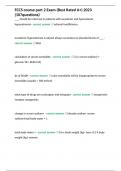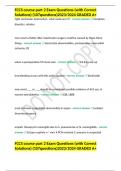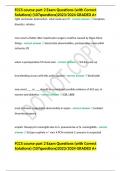Fccs course part 2 - Study guides, Class notes & Summaries
Looking for the best study guides, study notes and summaries about Fccs course part 2? On this page you'll find 36 study documents about Fccs course part 2.
Page 4 out of 36 results
Sort by
FCCS course part 2 Exam (Best Rated A+) 2023 (107questions)
FCCS course part 2 Exam Questions (with Correct Solutions) (107questions)2023/2024 GRADED A+
FCCS course part 2 Exam Questions (with Correct Solutions) (107questions)2023/2024 GRADED A+
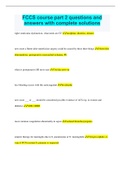
-
FCCS course part 2 questions and answers with complete solutions
- Exam (elaborations) • 17 pages • 2023
- Available in package deal
-
- $9.99
- + learn more
FCCS course part 2 questions and answers with complete solutions right ventricular dysfunction- what meds are CI? morphine, diuretics, nitrates new onset a flutter after reperfusion surgery could be caused by these three things electrolyte abnormalities, perioperative myocardial ischemia, PE when is perioperative MI most seen 3rd day post-op less bleeding occurs with this anticoagulant bivalirudin new onset ___ or ___ should be considered possible evidence of ACS esp. in women and diabetics ...
FCCS Review exam bundle with 100% correct answers/guaranteed success
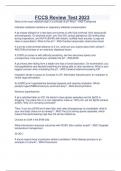
-
Review and Pretest FCCS All Correct 2023,
- Package deal • 18 items • 2023
-
- $120.49
- + learn more
Review and Pretest FCCS All Correct 2023 Which of the following parameters may be a late sign of cardiovascular disturbance signaling failure of the compensatory mechanisms? A. Tachycardia B. Bradycardia C. Hypotension D. Hypertension - ANS-C Investigative tests should be based on the patient's history and physical examination as well as on p

How did he do that? By selling his study resources on Stuvia. Try it yourself! Discover all about earning on Stuvia

